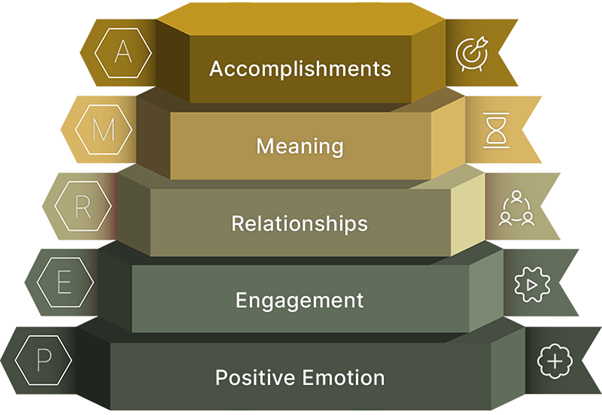Wellbeing and Happiness – an examination
Happiness: The often overlooked facet of national well-being.
Happiness and Individuals

And here is another take - Positive Psychology…
The five building blocks of happiness.
The PERMA model revolutionised the psychology world when it was introduced in 2012. It immediately became a cornerstone of positive psychology, shifting psychology’s focus from ‘fixing’ people’s ‘faults’ to helping people flourish.
Happiness and optimism are now known to be essential precursors to success and fulfilment. PERMA, sometimes called the “human dashboard,” is a proven framework for improving people’s subjective wellbeing by focusing on five life dimensions.

It should be mentioned at this point that this model is a product of an organisation that is selling its services – and I am including it as one example of positive psychology Products on the market!
In 1998, Dr. Martin Seligman used his inaugural address as the incoming president of the American Psychological Association to shift the focus from mental illness and pathology to studying what is good and positive in life. From this point in time, theories and research examined positive psychology interventions that help make life worth living and how to define, quantify, and create wellbeing.
In developing a theory to address this, Seligman selected five components that people pursue because they are intrinsically motivating and they contribute to wellbeing. These elements are pursued for their own sake and are defined and measured independently of each other.
These five elements or components (PERMA; Seligman, 2012) are:
- Positive emotion
- Engagement
- Relationships
- Meaning
- Accomplishments
P – Positive Emotion
Positive emotion is much more than mere ‘happiness.’
Positive emotions include hope, interest, joy, love, compassion, pride, amusement, and gratitude. Positive emotions are a prime indicator of flourishing, and they can be cultivated or learned to improve wellbeing
E-Engagement
The concept of engagement is something much more powerful than simply “being happy,” but happiness is one of the many byproducts of engagement.
Ways to increase engagement:
- Participate in activities that you really love, where you lose track of time when you do them (Bonaiuto et al., 2016).
- Practice living in the moment, even during daily activities or mundane tasks (Belitz & Lundstrom, 1998).
- Spend time in nature, watching, listening, and observing what happens around you (Petersen et al., 2021).
- Identify and learn about your character strengths, and do things that you excel at (Lai et al., 2018).
R – Positive Relationships
Relationships encompass all the various interactions individuals have with partners, friends, family members, colleagues, bosses/mentors/supervisors, and their community at large.
Relationships in the PERMA model refers to feeling supported, loved, and valued by others. Relationships are included in the model based on the idea that humans are inherently social creatures. There is evidence of this everywhere, but social connections become particularly important as we age.
M – Meaning
Another intrinsic human quality is the search for meaning and the need to have a sense of value and worth. Seligman discussed meaning as belonging and/or serving something greater than ourselves. Having a purpose in life helps individuals focus on what is really important in the face of significant challenge or adversity.
Having meaning or purpose in life is different for everyone. Meaning may be pursued through a profession, a social or political cause, a creative endeavour, or a religious/spiritual belief. It may be found in a career or through extracurricular, volunteer, or community activities.
A – Accomplishments/Achievements
Accomplishment in PERMA is also known as achievement, mastery, or competence.
A sense of accomplishment is a result of working toward and reaching goals, mastering an endeavour, and having self-motivation to finish what you set out to do. This contributes to wellbeing because individuals can look at their lives with a sense of pride.
Wider Perspectives
Well-being and the actions of governments
- The effectiveness of the government can have a major influence on human happiness of the people.
- The capacity of a state can be well-measured by
- its fiscal capacity (ability to raise money)
- its collective capacity (ability to deliver services)
- its legal capacity (rule of law)
- Also crucial are
- the avoidance of civil war, and
- the avoidance of repression.
- Across countries, all these five measures are well correlated with the average life satisfaction of the people.
- Using the five characteristics (and income), it is possible to classify states into 3 clusters: common-interest states, special-interest states and weak states. In common-interest states, average life satisfaction is 2 points (out of 10) higher than in weak states and in special-interest states it is 1 point higher than in weak states.
- In those countries where average life satisfaction is highest, it is also more equally distributed – with fewer citizens having relatively low life satisfaction.
How’s Life? National wellbeing.
Finland

Good education and skills are important requisites for finding a job. In Finland, 91% of adults aged 25-64 have completed upper secondary education, higher than the OECD average of 79%. However, completion varies between men and women, as 89% of men have successfully completed high school compared with 94% of women. In terms of the quality of the education system, the average student scored 516 in reading literacy, maths and science in the OECD's Programme for International Student Assessment (PISA). This score is higher than the OECD average of 488. On average in Finland, girls outperformed boys by 27 points, well above the average OECD gap of Finland performs well in many dimensions of well-being relative to other countries in balance, environmental quality, social connections, safety and life satisfaction. These assessments are based on available selected data.
Money, while it cannot buy happiness, is an important means to achieving higher living standards. In Finland, the average household net-adjusted disposable income per capita is USD 33 471 a year, more than the OECD average of USD 30 490 a year.
In terms of employment, about 72% of people aged 15 to 64 in Finland have a paid job, above the OECD employment average of 66%. Some 74% of men are in paid work, compared with 71% of women.
In terms of health, life expectancy at birth in Finland is around 82 years, one year higher than the OECD average of 81 years. Life expectancy for women is 85 years, compared with 79 for men. The level of atmospheric PM2.5 – tiny air pollutant particles small enough to enter and cause damage to the lungs – is 5.5 micrograms per cubic meter, below the OECD average of 14 micrograms per cubic meter. In Finland, 97% of people say they are satisfied with the quality of their water, much higher than the OECD average of 84%.
Concerning the public sphere, there is a strong sense of community and moderate levels of civic participation in Finland, where 96% of people believe that they know someone they could rely on in time of need, more than the OECD average of 91%. Voter turnout, a measure of citizens' participation in the political process, was 69% during the Better Life Index. Finland outperforms the average in education. In recent elections; voter turnout for the top 20% of the population is an estimated 78% and for the bottom 20% it is an estimated 64%.
When asked to rate their general satisfaction with life on a scale from 0 to 10, Finns gave it a 7.9 grade on average, much higher than the OECD average of 6.7.
According to the World Inequality Database, the highest-paid tenth of people in Finland take home a third of all income (33%). That contrasts with the same group taking 36% in the UK and 46% in the US. These differences may not appear great, but they have a huge effect on overall happiness because so much less is left for the rest in the more unequal countries – and the rich become more fearful. When a small number of people become much richer, this is an understandable fear.
The Top 7 Happiest Countries in the World
Finland ranks as the world's happiest country based on the 2021 report, with a score of 7.842 out of a total possible score of 10. The report writers credited the citizens of Finland's strong feelings of communal support and mutual trust with not only helping secure the #1 ranking, but (more importantly) helping the country as a whole navigate the COVID-19 pandemic. Additionally, Finlanders felt strongly that they were free to make their own choices, and showed minimal suspicion of government corruption. Both of these factors are strong contributors to overall happiness.
The second-happiest country in the world is Denmark, which scores 7.620. Denmark's values for each of the six variables are quite comparable to those of Finland. In fact, Denmark even outscored the leader in multiple categories, including GDP per capita, generosity, and perceived lack of corruption, demonstrating that it may claim the top spot sometime in the near future.
As the third-happiest country in the world, Switzerland scored a total of 7.571 out of 10. In general, the Swiss are very healthy, with one of the world's lowest obesity rates and a long life expectancy. The Swiss also have a very high median salary, about 75% higher than that of the United States, and the highest GDP per capita in the top seven. Additionally, there is a strong sense of community in Switzerland and a firm belief that it is a safe and clean country—which is statistically true. Along with Iceland and Denmark, Switzerland is one of the world's safest countries.
Iceland ranks as 2021's fourth-happiest country in the entire world, with a total score of 7.554. Of the top seven happiest countries around the globe, Iceland has the highest feeling of social support (higher even than Finland, Norway, and Denmark, which all tied for second place). Iceland also had the second-highest generosity score in the top seven, though it's worth noting that it ranked only 11th worldwide.
The citizens of sixth-place Norway (7.392) feel they are being well cared for by their government thanks to universal healthcare and free college tuition. Norwegians also enjoy a healthy work-life balance, working an average of 38 hours per week vs. 41.5. hours per week in the United States. Additionally, Norway has a low crime rate and a strong sense of community among its citizens—a quality it shares with many of the top seven.
Seventh-place Sweden (7.363) ranks high, if not quite highest, in virtually every category measured. For example: Sweden has a higher lack of corruption score than all but four countries worldwide (two of which are Finland and Denmark), the fourteenth-highest GDP per capita of all 149 countries measured, and the fourth-highest life expectancy in the top seven.
Other Nations
Country Happiness Ranking 2024 Happiness Score 2024 Score change Ranking 2023 Score 2023 Ranking 2022 Score 2022 New Zealand 11 7.03 -0.09 10 7.12 10 7.20 Costa Rica 12 6.96 0.35 23 6.61 23 6.58 Kuwait 13 6.95 50 6.11 Austria 14 6.91 -0.19 11 7.10 11 7.16 Canada 15 6.90 -0.06 13 6.96 15 7.03 Belgium 16 6.89 0.03 17 6.86 19 6.80 Ireland 17 6.84 -0.07 14 6.91 13 7.04 Czech Republic 18 6.82 -0.02 18 6.84 18 6.92 Lithuania 19 6.82 0.06 20 6.76 34 6.45 United Kingdom 20 6.75 -0.05 19 6.80 17 6.94 Slovenia 21 6.74 0.09 22 6.65 22 6.63 United Arab Emirates 22 6.73 0.16 26 6.57 24 6.58 United States 23 6.73 -0.16 15 6.89 16 6.98 One More Time - Happiness in Individuals……
Science Says These Five Things Will Make You Happier
People often think things like money or luxury lead to happiness, but research indicates some healthy life practices may actually be the key. Simple experiences like spending time with friends and family or practicing gratitude may promote a healthier outlook on life. Looking for ways to shift negative thinking? Want to increase positivity in your life? Ready to put that gratitude journal to good use? Here are five ways you can boost your happiness on a daily basis.

Practice Daily Gratitude
Expressing gratitude has been shown to do more than improve your mood. People who write down a few positive things about their day are healthier, more energetic, less stressed and anxious and get better sleep. The key is to make this a regular habit and do it with intention. Think about creating a small gratitude ritual. For example, every morning when you have your coffee you could think of three things that you appreciate about the day before.
Or make it a habit to jot down three good things about your day before you go to bed at night. Your three good things can be really small — perhaps you saw something beautiful or just appreciate being healthy that day. In fact, science shows that it's the small everyday experiences that make us happier, as compared to big life events.
Surround Yourself with Positive People
Happiness is contagious. Dr. Nicholas Christakis and James Fowler, researchers at Harvard and The University of San Diego, found that each additional happy friend increases a person's probability of being happy by about nine percent. If you're feeling down, reach out to a friend or colleague who generally has a more positive attitude. Our brains have mirror neurons that will literally mimic what the other person is expressing. So when you need a bit of positive infusion, connect with those who share it.
Do Regular Acts of Kindness
Research has shown that spending money on others makes us happier than spending money on ourselves and doing small acts of kindness increases life satisfaction. Hold the door for the person behind you, say thank you and mean it when you get your drink from the coffee shop, pick up your colleague's favorite snack and leave it on their desk for them. Even the smallest nice gesture can make someone's day.
Spend More Time with Family and Friends
Having friends can save your life. Low social interaction can be as bad for you as smoking 15 cigarettes a day and is twice as bad for your health as obesity. Even if you're busy, you can find ways to connect with people you care about. Use your lunch break as an opportunity to call a friend or, if possible, take a walk together. If you're busy during the week, how about inviting your friend to do some errands together on the weekend?
Spend Money on Experiences Instead of Things
Research shows people report feeling happier when they spend their money on experiences rather than objects. We remember experiences for a longer period of time and our brains can re-live them, making our positive emotions last longer. So instead of that new pair of jeans consider trying a new yoga class or inviting a friend to the movies with you.



